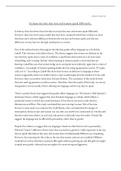Essay
Evaluate the idea that men and women speak differently (30 marks)
- Institution
- AQA
This essay looks at the different theories and counter theories involved in discussing whether there is a difference in the way that men and women speak. This essay received an A* or a 27/30, with 10/10 in AO1 (describe) and 17/20 in AO3 (evaluate) with the target being to have a more thorough con...
[Show more]



